Kategorie: ‘Energie und Umwelt’
Energy Park Herzogenrath: Chair of Electrochemical Energy Conversion and Storage Systems is involved in research
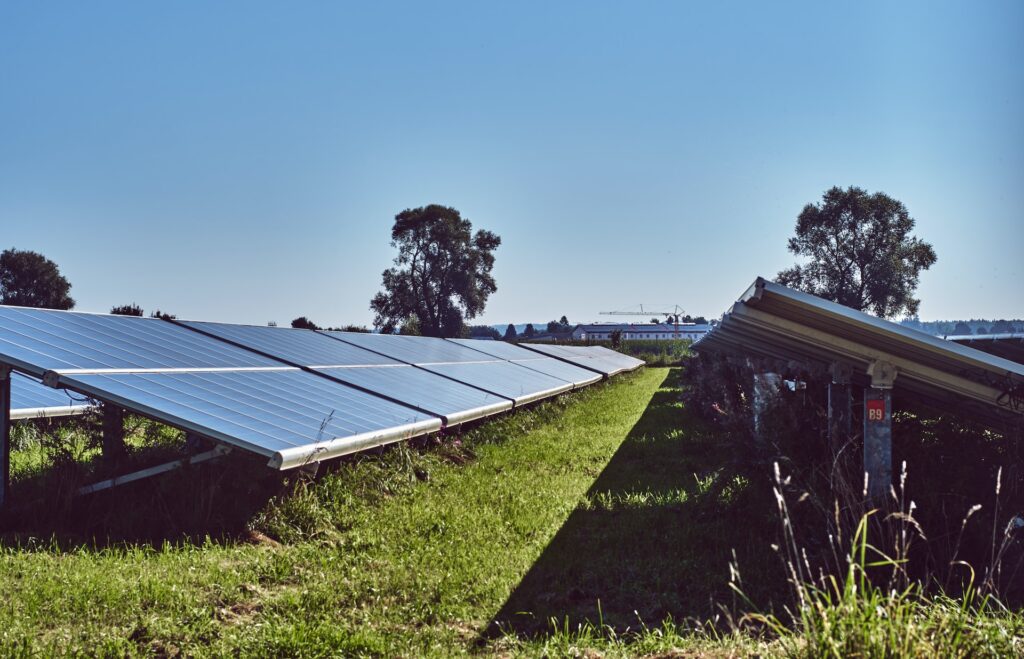
© Michael Förtsch by Unsplash
The project for CO2-neutral energy supply in Herzogenrath, the first city in NRW to strive for this goal, is accompanied by a consortium of four chairs and institutes, including the Chair of Electrochemical Energy Conversion and Storage Systems Technology.
Herzogenrath wants to achieve CO2-neutral energy supply by 2030. A consortium of Siemens Energy, RWTH Aachen University, Aachen University of Applied Sciences and the Niederrhein University of Applied Sciences is conducting research on the project “Energy Park Herzogenrath Research & Development”, which is funded by the Federal Ministry of Economics and Climate Protection with 2.7 million euros. The project is also closely interlinked with other ongoing research and funding projects: at the local flat glass manufacturer Saint Gobain, CO2-free production is being researched, in which the Chair of Electrochemical Energy Conversion and Storage Systems Technology at the E.ON Energy Research Center (ERC) of RWTH Aachen University is involved. The aim is to recycle the heat generated during glass production in Herzogenrath and Kerkrade in the Netherlands as green heating energy.
The project uses a digital twin that virtually maps and simulates the energy supply. In this way, different scenarios can be tested and optimised. The project looks at generation, consumption and marketing options across sectors. RWTH is receiving around 918,000 euros in funding for this.
More information on the project can be found at Energiepark Herzogenrath – Strukturwandel Rheinisches Revier (revier-gestalten.nrw) and at CO2-neutral bis 2030: Forschungsprojekt Energiepark Herzogenrath mit rund 2,7 Millionen Euro gefördert | Wirtschaft NRW.
Climate protection through electrical engineering – Professor Dirk Uwe Sauer’s lecture at the Children’s University
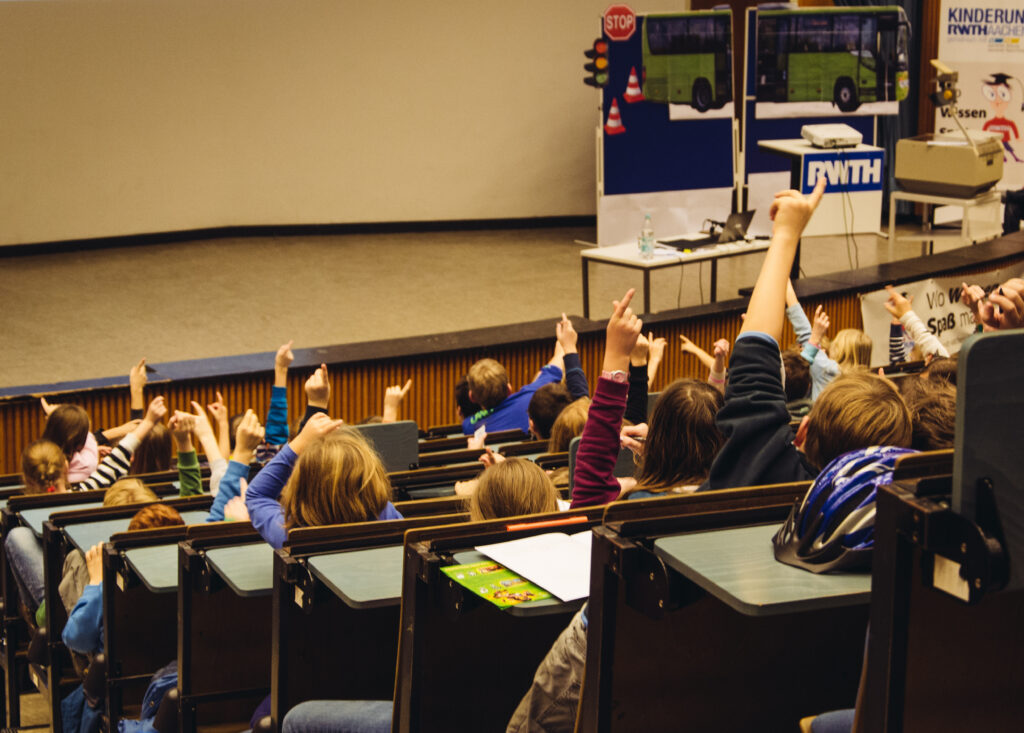
Kinder im Hörsaal. ©RWTH Aachen University
Whether drought, floods or forest fires – the consequences of global warming are dramatic for nature and people. The countries of the global south are being hit particularly hard, but the effects are also being felt here. We experienced this at the latest with the devastating floods in July 2021. That is why we urgently need to address the issue of climate change.
This is also what Dirk Uwe Sauer, Professor of Electrochemical Energy Conversion and Storage Systems Technology at RWTH Aachen University, is doing. He has been researching new energy systems for over 30 years and advises politicians on the energy transition.
„We see in all places that climate change is happening – with many negative consequences. And we urgently need a radical change in the way we have supplied ourselves with energy so far.“
This does not only affect us adults, but especially the children and young people of today. They will have to live with the limitations that climate change will bring. “I don’t think we should underestimate what children know and what they are capable of,” says Professor Sauer.
It is not too late to make a difference
In his lecture, the physicist not only explained the dangers of climate change, but also made the necessary changes understandable. He used various materials such as videos, slides and interactive presentations to show the physical basics and the possibilities through timely action: “I also want to spread optimism and show that things can also get better than they currently are. Because if we still grab the wheel in time, then we still have the possibility to avoid worse things.” For this to happen, however, society must overcome its fear of new technologies. The professor said that there is too much talk about the risks instead of seeing the opportunities. “And we simply can’t afford that now either.” A ruling by the Federal Constitutional Court in 2021 has obliged politicians, and thus the population, to act more quickly. The slower progress is made, the more the living conditions of the next generations are restricted. That is why the previous federal government tightened the climate protection targets and the Climate Protection Act. “We have the opportunity to achieve these goals. We have the necessary technologies to supply all eight billion people in the world properly with renewable energy,” Sauer said.
Climate change is an important issue that concerns us all. But what does it actually mean and how can we work against it? Professor Sauer explained this to the children in his lecture at the Children’s University on 16 June 2023. He showed them how the earth is warming up and what consequences this has for nature and people. He also presented solutions on how we can protect the climate with renewable energies and new technologies. For example, with solar cells that generate electricity from sunlight, or with electric cars that emit no exhaust gases. Professor Sauer showed the children not only the problems of climate change, but also the opportunities that arise from it. He showed them that we can not only influence the climate with our energy supply, but also promote biodiversity.
„I would like to show the children that, for example, large photovoltaic systems on open fields not only generate electricity, but also create space for extensive agriculture, for insects that can live and flourish in these areas again.“
Climate change is a major challenge that we can only overcome together. For this, we need an awareness of the connections between energy and the environment that starts with children. Another goal of the Children’s University event was to get the children excited about scientific topics. “Physics has the great advantage that it can illustrate things very vividly and also show connections,” said Sauer. Using simple means, Professor Sauer showed where research starts and what possibilities can arise through technical progress.
Source: Aachener Zeitung, 16 June 2023
Excellent placement in global university ranking

© Kurt Beyer
In electrical engineering, RWTH Aachen is one of the three best German universities. This is the result of the internationally highly regarded QS Ranking by Subjects of the British information service provider Quacquarelli Symonds. Presented in its latest version, the subject ranking is based on various criteria that are weighted according to subject. An online reputation survey among university graduates and employers accounts for between 40 and 100 percent of the total points and is considered the most important indicator. Citations, which scientific papers from universities receive on average, account for up to 60 percent. For some engineering and natural science subjects, international research networks are also taken into account.
The Aachen University of Excellence was able to place itself on the winner’s podium in many subjects throughout Germany and is also convincing in an international comparison. In ten subjects, it placed among the 100 best worldwide. RWTH did particularly well in the subjects of mining engineering with 15th place and mechanical engineering with 19th place.
For more information: www.topuniversities.com
“Hex-Hex”: Text – Thesis written!

The right magic formulas are taught in the courses of the “Schreibwerkstatt E-Technik”. The face-to-face course offers bachelor’s and master’s students at the Faculty of Electrical Engineering and Information Technology customized preparation for writing their upcoming seminar papers or dissertations. Participants benefit from acquired basic knowledge and writing strategies, which can be further developed in an individual online consultation. Upon successful participation, students earn a certificate and 3 CP, which can be credited towards elective credits.
International students must prove a German language level of at least C1.2 as a participation requirement for the course. The online writing consultation takes place in either German or English.
Registration deadline: March 27 – April 3, 2023
Dates:
| Group 1 02.84000 |
Group 2 02.84000 |
| Wednesdays April 19, 2023 Mai 3, 2023 Mai 17, 2023 June 6, 2023 each from 2.30 to 5.30pm |
Wednesdays April 26, 2023 Mai 10, 2023 Mai 24, 2023 June 21, 2023 each from 2.30 to 5.30pm |
Registration is via user account at Language Center.
Contact for inquiries: schreibzentrum@sz.rwth-aachen.de
Top placements in international ranking

The portal Research.com informs in the newly published ranking that the Electrical Engineering and Information Technology of the RWTH achieved the 2nd place in the Germany-wide comparison. Internationally, RWTH ranks 65th in this discipline.
Research.com evaluates the frequency of citations of scientific articles and other publications for the ranking. Data from the OpenAlex and CrossRef databases are used for the evaluation. Researchers are ranked using the D-index, a variation of the H-index, which measures citations to their scientific papers within a discipline. All those who achieve a D-index of at least 30 are included in the rankings. The sum of the D-indexes of all listed scientists of a university is then decisive for its placement in the university ranking.
Accordingly, the following RWTH Electrical Engineering and Information Technology professors have qualified for the ranking:
- Dirk Uwe Sauer from the Chair of Electrochemical Energy Conversion and Storage Systems Engineering.
- Rik W. De Doncker from the Chair of Power Electronics and Electrical Drives
- Heinrich Meyr from the Chair for Distributed Signal Processing
- Antonello Monti from the Institute for Automation of Complex Power Systems
- Max Lemme from the Chair of Electronic Components AMICA – Advanced Microelectronic Center Aachen
- Steffen Leonhardt from the Chair of Medical Information Technology
- Petri Mahönen from the Chair and Institute of Networked Systems
- Rainer Leupers from the Chair of Software for Systems on Silicon
Gold and bronze at the 2023 Innovation Awards ceremony
Congratulations to all winners of this year’s Innovation Awards for pioneering university projects whose contribution particularly enriches the Aachen region as a location for innovation.
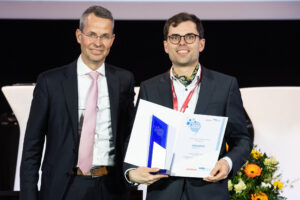
Professor Malte Brettel and award winner Dr.-Ing. Moritz Joseph from Team Neureka.
Gold went to the team Neureka around Professor Rainer Leupers from the Chair of Software for Systems on Silicon with a development kit on hardware – and software level for neuromorphic AI chips in edge applications.
Neuromorphic computing systems replicate the way the human brain works, as they combine computation and memory units and thus enable an enormous increase in performance in artificial intelligence. Neuromorphic chips already available today promise tens to hundreds of times improved energy efficiency, latency, and space efficiency. Neureka has successfully met the challenge of making the complicated system design of this technology accessible to industry.
The Hardware Development Kit integrates purchased neuromorphic chips into an existing computing system, allows validation of neuromorphic hardware, and is a development platform for market-ready AI devices. The software development kit enables easy programming and simulation of AI applications on neuromorphic systems. Software developers can thus bring low-risk AI applications to disruptive neuromorphic hardware and reduce the energy consumption of AI.
Customers of both developments are industrial users, mobile device manufacturers and smart city IoT device providers.
Silver went to an electromagnetically heatable nanomodified stent for the treatment of hollow organ tumors, developed in collaboration by Ioana Slabu of the Institute of Applied Medical Engineering and Benedict Bauer of the Institute of Textile Engineering.
Bronze went on the one hand to the team working with Mathias Bode from the Institute of Technical Combustion in cooperation with the Jülich Supercomputing Centre. Their software-as-a-service platform JuLES is considered a key technology for the climate-neutral transformation of industrial processes.
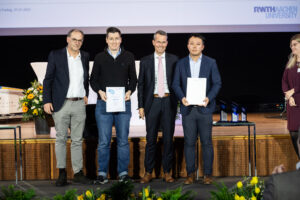
Professor Heinz Pitsch with Mathis Bode to the left and Weihan Li to the right after the handover of the certificate by Professor Malte Brettel.
On the other hand, the team from the Chair of Electrochemical Energy Conversion and Storage Systems Technology, headed by Professor Dirk Uwe Sauer, was also pleased to receive bronze. The award honored the development of a digital battery twin to increase efficiency and safety in the application field.
Lithium-ion batteries are emerging as the technology for energy storage, especially in the field of electromobility, due to their low cost and high energy density. However, their performance degrades over time. Condition monitoring and prediction of battery aging not only benefits safety, maintenance, and asset optimization, but is also the starting point for technical and economic analysis of potential second-life applications.
The developed cloud battery management system covers seven key functions to control the entire life cycle of batteries, enabling online monitoring of aging, prediction of aging progression, and optimization of operation strategy to limit aging.
The innovation contributes to the acceleration of the energy transition and the electrification of transport. It also opens up commercial opportunities for a wide range of industries, such as digital certificates for batteries, battery warranties and insurance, and predictive and timely warning of safety-critical conditions.
New research center CARL ushers in a new era
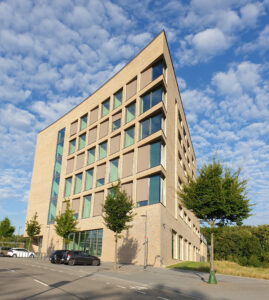
CARL research building as a 6-story new building with a sloping roof, standing in solid construction in research cluster F along Campus Boulevard.
We congratulate the Institute for Power Electronics and Electrical Drives on moving into the new research building CARL – Center for Ageing, Reliability and Lifetime Prediction of Electrochemical and Power Electronic Systems – on the Melaten campus.
Three large laboratory halls as the heart of CARL and an interdisciplinary research network of ten core professorships, about 20 other chairs and institutes of RWTH Aachen and Forschungszentrum Jülich will now make it possible to push groundbreaking research work on battery aging and lifetime prediction of power electronics from a holistic perspective. “We want to understand down to the atomic and crystal level how energy storage devices function and respond to different requirements,” says Professor Dirk Uwe Sauer of ISEA, explaining the fundamental idea behind CARL.
Test benches for load and environmental simulations are set up in the first laboratory area. For example, this involves electrical, mechanical, chemical or climatic influences on the materials and systems of batteries and power electronics. Here, aging processes are run and analyzed in fast motion, as it were, in order to be able to investigate their causes in detail.
The second laboratory area deals with the construction of prototypes. The performance of entire systems or even individual components is to be examined here in order, for example, to be able to rule out material or design faults at an early stage.
Finally, the third laboratory area is dedicated to physical-electrochemical analysis. With the aid of an analysis chain for structural and material investigations, which will include a state-of-the-art computer tomograph with unprecedented resolution, the structures of the material can be examined and analyzed down to atomic resolution.
Consideration will be given to both the end user and the developer of machines and materials for the production of batteries and power electronics. “With our research results, we can help accelerate development cycles and ultimately save money by optimally configuring systems,” says Professor Sauer. This is because the question of service life is essential for economic considerations. For example, it is important for car manufacturers to be able to estimate depreciation periods, warranty services and reliability as part of functional safety.
Friedrich Wilhelm Awards 2022
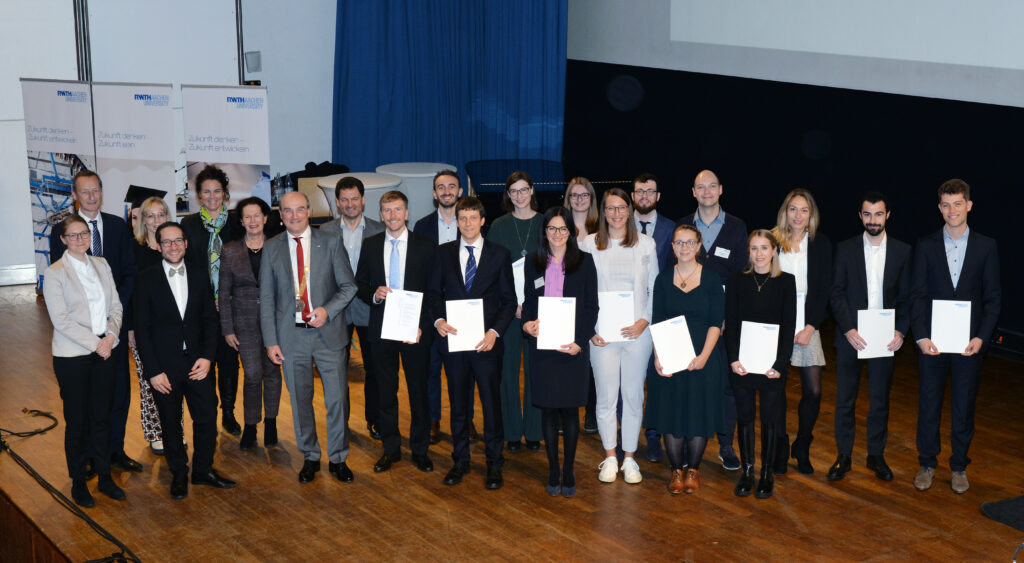
RWTH Rector Ulrich Rüdiger honored 17 outstanding graduates of RWTH Aachen University with the Friedrich Wilhelm Awards 2022.
Photo: Andreas Schmitter
Honoring outstanding achievements by RWTH Aachen graduates
The Friedrich Wilhelm Prize is awarded annually by the foundation of the same name in the form of prize money to students and researchers at RWTH Aachen University who have been selected for their outstanding achiements in their theses. Among this year‘s recipients are Maxim Christian Maria Müllender, Master of Science, from the Institute of High Voltage Equipment and Grids, Digitalization and Energy Economics and Laurids Schmitz, Master of Science, from the Institute for Power Electronics and Electrical Drives. Both winners were recognized due to their excellent master‘s theses.
Funding for research and teaching
The name of the foundation goes back to the Prussian crown prince and later Emperor Friedrich Wilhelm III., who founded a polytechnic institute in the Rhine province in 1858 using a donation from the Aachen and Munich fire insurance companies. In doing so, he laid the foundation for both the Rheinisch-Westfälische Technische Hochschule and the Friedrich Wilhelm Foundation, which is founded 1865 by the legal predecessor of today‘s Aachener und Münchener Beteiligungsgesellschaft. Since then, the promotion of research and teaching and the support of students and researchers at the RWTH Aachen have been the central concerns of the foundation.
“ELMAR” project: The ISEA is part of it!
The objective of the ELMAR project is to integrate the use of electric heavy mining machinery in the domestic extractive industry and demonstrate its utility.
A secure supply of mineral raw materials is essential for the competitiveness and prosperity of Germany and Europe. At the same time, raw material extraction results in substantial carbon dioxide emissions and therefore needs to become more sustainable in order to help achieve climate targets and to remain competitive. This includes, in particular, the decarbonization of operations that extract raw material. In Germany, this affects around 1,600 companies with around 2,700 plants and 23,500 employees in gravel, sand, and natural stone production alone.
Up to now, a significant proportion of the energy used in the extraction of raw materials at these plants has been used for internal transport. And most of this energy is being consumed by mobile diesel-powered (heavy-duty) vehicles. Conversion to (battery) electric operation is therefore a key lever for reducing emissions in this sector. This applies to the retrofitting of existing companies as well as to future projects.
Decarbonization of Domestic Raw Material Extraction – A Holistic Approach
In the newly launched ELMAR project, a consortium of research and industry partners is investigating how the decarbonization of the raw materials sector can be achieved and implemented in a holistic approach. The project involves the deployment of autonomous electric heavy-duty electric mine transport systems, the adaptation of the infrastructure this requires, and the redesign of operational processes. In addition, the project seeks to optimize the matching of energy demand and energy supply with the help of a connected, model-based and intelligent operational management.
ELMAR lays an important foundation for the integration of electric automated mobile heavy-duty transport machines in raw material extraction,” says Dr. Tobias Hartmann of the Institute for Advanced Mining Technologies at RWTH Aachen University. “Maintaining process reliability in extraction while ensuring security of electrical supply, as well as coupling it to renewable energy sources, we want to demonstrate in representative application scenarios that electrical transport is possible in domestic resource extraction. The holistic approach taking production, energy demand and energy supply aspects int account makes it possible to optimize existing and upcoming operating concepts.”
The consortium consists of two RWTH institutes, the Institute for Advanced Mining Technologies (AMT) and the Institute for Power Electronics and Electrical Drives (ISEA), and industry partners. Volvo Group Trucks Central Europe GmbH, Volvo Construction Equipment Germany GmbH, and Volvo Autonomous Solutions AB (commissioned by VCE Germany GmbH), are participating as construction equipment and transport vehicle manufacturers and automation providers. Other partners include mine operators Mineral Baustoffe GmbH (part of the STRABAG Group), Knauf Gips KG, and Nivelsteiner Sandwerke & Sandsteinbrüche GmbH; AI and cloud-based software providers PSI Fuzzy Logik & Neuro Systeme GmbH and PSI Software AG; and TITUS Research GmbH as a developer of autonomous monitoring systems.
The ELMAR project is scheduled to run until the end of July 2025 and receives around 6 million euros from the German Federal Ministry of Economics and Climate Protection (BMKW) as part of the “Research and Development in the Field of Electromobility” funding initiative.The total project volume is around 11 million euros.
Contact:
Dr.-Ing. Tobias Hartmann
Institute for Advanced Mining Technologies (AMT)
Telefon: +49 241 80 90755
E-Mail: thartmann@amt.rwth-aachen.de
www.amt.rwth-aachen.de/
Source: University News
German Study Award of the Körber Foundation 2022: 2nd Prize Goes to Weihan Li from ISEA

© David Ausserhofer: Dr. Weihan Li
Dr. Weihan Li has been awarded the second German Study Prize of the Körber Foundation for his dissertation.
Every year, the foundation awards the German Study Award to the best doctoral students from all disciplines. The main focus here is on the social significance of the research. We congratulate Dr. Weihan Li from the Institute for Power Electronics and Electrical Drives for his outstanding achievement.
Abstract:
Machine learning for efficient battery use in mobility and energy supply for sustainable climate protection
In the fight against climate change, batteries play a crucial role as a flexible energy storage system for renewable energies. However, battery ageing during use is proving to be the limiting factor for an efficient and reliable future energy system. In this work, machine learning enables online ageing diagnosis, prediction of future ageing progression and optimisation of operation strategy, which not only increases battery performance and lifetime, but also reduces unexpected failures and contributes to more transparency about battery health. The methodology developed improves battery use in mobile and stationary applications, enabling safer and longer-lasting operation, which saves costs in the long term, conserves resources and is socially feasible. This work thus provides an essential building block for the broad acceptance and implementation of climate-friendly mobility and energy supply on the way to a climate-neutral energy system.
We would also like to congratulate Dr. Lars Nolting from the Chair of Energy System Economics at RWTH Aachen University on winning the first prize, as well as all the other prize winners:
Dr. Manuel Häußler from the University of Konstanz, Dr. Kim Teppe from the University of Hamburg, Dr. Julia Böcker from the University of Lüneburg, Dr. Mareike Trauernicht from the Free University of Berlin and Dr. Felix Lansing from the Technical University of Dresden.
For more information on the German Study Award 2022, please see the press release of the Körber Foundation.



